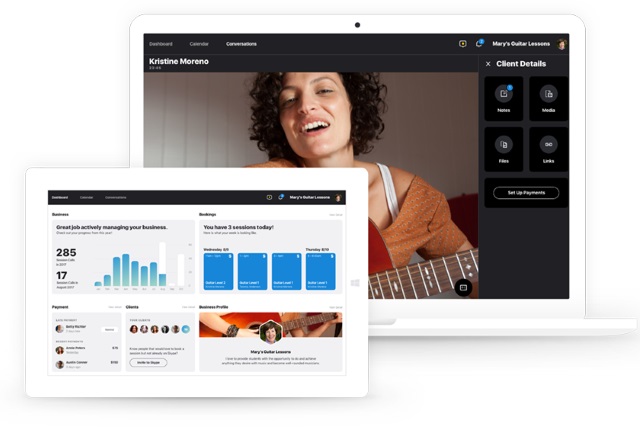
A quarter of UK healthcare IT pros not confident in response to cyber attacks
According to a new report, one in four UK healthcare IT professionals aren't confident in their organization's ability to respond to cyber attacks.
Research from network intelligence company Infoblox finds that disruption caused to the NHS by WannaCry in May 2017 means many healthcare organizations are preparing themselves for further ransomware attacks.

Xbox One digital game gifting now available to everyone
Buying an Xbox One game as a gift for Christmas, birthday, or other occasion no longer means having to hit the stores, or buy a gift card. Microsoft has now opened up digital game gifting to everyone.
While this is not a completely new option, it was previously only possible to send games to people via Xbox Live. Now you can buy a digital game for a friend or family member, and send it to them via email.

Microsoft announces Skype Professional Account Preview
Microsoft has announced the upcoming release of a Skype Professional Account desktop client. Due to launch in the US as a preview very soon, this is a business-focused build of Skype that offers a host of extra features.
This includes the ability to book meeting, make notes and take payments, all from the comfort of a chat client. The aim is to reduce the number of tools and services anyone conducting a business online needs to use.

Linksys unveils RE9000 Max-Stream Tri-Band MU-MIMO AC3000 Wi-Fi Range Extender
Mesh networking is all the rage nowadays. If you aren't familiar with the concept, a mesh network links several access points into a single wireless network, providing improved range and speed. The problem with a mesh network, however, is that it requires you to purchase all new hardware. If you already own a great router, but need to eliminate a dead zone in your home, it might not make sense to invest in mesh right now.
If you love your existing router but want to expand your Wi-Fi coverage, a range extender is a smart buy. It is a device that connects wirelessly to your existing router and then provides access to your dead or spotty zones. Today, Linksys unveils one of the most beautiful such devices. The "RE9000 Max-Stream Tri-Band AC3000 Wi-Fi Range Extender," as it is called, has four antennas and promises to improve your home's Wi-Fi coverage. It can also serve as an access point to convert up to four hardwired gigabit device connections into wireless. Linksys even provides a useful app to help you find optimal placement of the extender -- nice.

Do you have a jailbroken Apple TV running Kodi? You are in danger of being hacked!
The Apple TV has long been a wonderful device for consuming media on your big-screen television. From video to music, it is a great experience. Some people weren't satisfied with the default functionality, however, opting to jailbreak Apple's media box. In fact, the jailbroken Apple TV 2 was one of the most popular XBMC/Kodi boxes for this reason.
Are you running one of those jailbroken Apple TV 2 devices? You should be worried then. You see, as the folks over at TVAddons warn, the jailbreak process installed OpenSSH by default. This means your network could be compromised by the fairly outdated media box. A hacker only needs your ip address to attack you.

Mozilla Firefox 57 unveils new speedy Quantum browsing engine, revamps user interface
Mozilla has placed Firefox 57.0 on its servers for download, ahead of its official release tomorrow. Also due imminently is Firefox for Android 57.0. The new release sees the debut of Mozilla’s next-generation browsing engine, Quantum.
The new engine is paired with a major user-interface revamp boasting a more modern, pared-down look, plus feature highlights include improved Address Bar and redesigned new tab page. In addition there are major changes (with potentially significant consequences) to the browser’s extension support.

Android 8.1 Oreo will free up space by shrinking apps you don't use
We all have apps installed on our phones that we simply don't use. It might be that they once served a purpose that they no longer fulfil, and we just haven't got around to uninstalling, or it might be that we've downloaded an app, tried it once, and then forgotten about it.
These unused apps are, essentially, just wasting space, and now Google is doing something about it. With Android 8.1 Oreo, when a device is running low on space, an automatic cleanup process will tidy after these unused apps.

Google clamps down on apps that misuse accessibility API -- and it could affect your favorite apps
Google is launching a crackdown on apps that misuse Accessibility Services, threatening to remove them from the Play Store. The API was created specifically to help users with various disabilities, but developers have latched onto it as a way of increasing the functionality of their apps.
The likes of Tasker, LastPass and Universal Copy are among the titles that make use of the Accessibility Services API, and they have been warned to either explain why they are using the API, stop using the API, or unpublish their app.

New Kubernetes certification program helps deliver consistency in the cloud
Over the last three years open source container platform, Kubernetes has been adopted by a diverse community of providers including some of the biggest names in the cloud.
Now the Cloud Native Computing Foundation (CNCF) is launching a Kubernetes Software Conformance Certification program, which ensures Certified Kubernetes products deliver consistency and portability.

Red Hat Enterprise Linux gets ARM server support
While ARM has been slowly making inroads in the server market, it still has a long way to go before it can truly challenge the x86 architecture. Today, it makes a big step in the right direction thanks to Red Hat.
The enterprise open-source company has officially added ARM support to its Red Hat Enterprise Linux (also known as RHEL) server distribution, after two years of testing with partners like Qualcomm.

Microsoft's Black Friday deals could save you a bundle on Surface and Xbox devices
It may be more than a week until Black Friday, but the big-name companies are already releasing details of the money-saving deals that will be available. Microsoft is one such company, and today it has revealed price cuts for Surface devices, the Xbox One S, Windows Mixed Reality headsets, and more.
As well as offering savings of $329 off the Surface Pro i5 256GB, Microsoft also shares information about savings available from its partners -- including up to $300 off Windows 10 laptops.

Companies will waste over $10 billion in cloud spending in the next year
Wasted cloud spend over the next year could top $10 billion according to cloud management company RightScale.
Complexity in pricing and billing is a key reason for wasted cloud spend. A typical cloud bill can contain millions of items that represent tens of thousands of different resource types and price points.

Survey highlights disconnect between security expectations and reality
A new survey of IT decision makers shows that 89 percent are confident their organizations are in a good position to protect themselves from attacks, but four out of 10 are not taking steps to lock down information, putting themselves at risk of data loss.
The study from security software company Varonis polled 500 IT decision makers in the UK, Germany, France and the US. Fifty-four percent of respondents believe their company will face a major attack in the next year.

New container firewall solution speeds up enterprise integration
Containerization is increasingly a part of enterprise IT strategy, and like any other systems it needs to be properly secured.
Container security specialist NeuVector is releasing a new version of its container firewall security solution with key security, integration, and UI additions, along with a version aimed specifically at enterprises.

Samsung announces Exynos 9810 flagship processor likely to power Galaxy S9
Samsung does not reveal much information about a new flagship smartphone before launch day, but the homebrew processor that powers it is introduced in advance. So, it did not come as a surprise to see the Exynos 9 Series 8895 making its official debut ahead of the Galaxy S8.
Things appear to be no different this time around. The Galaxy S9 is months away, yet Samsung just announced the Exynos 9 Series 9810 flagship processor that is likely to underpin it.
